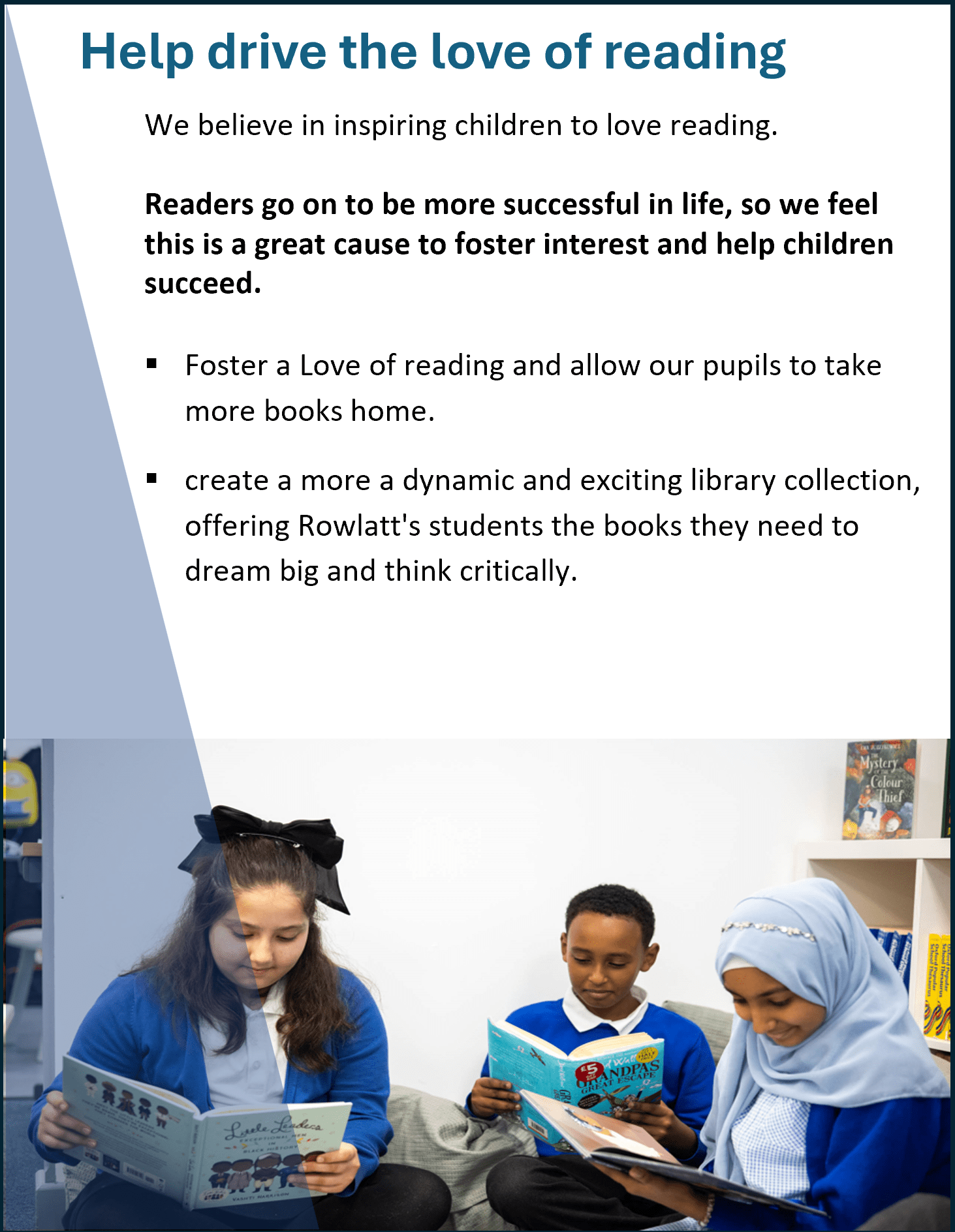Literacy at Rowlatts Mead Primary Academy, is an engaging and exciting subject in which pupils are exposed to a range of high quality novels, picture books and non-fiction texts. All Literacy teaching across the school uses the local authorities’ ‘Writing Project Approach’ to ensure that our children have regular opportunities to read and write across a range of text types and to ensure that they are developing a rich and varied vocabulary. This programme incorporates a range of strategies that enable our children to see writing as a means of expression and communication. A high standard of spoken language underpins all of our Literacy teaching and we are constantly striving to develop our children’s speaking and listening skills.
In EYFS and KS1, the Read, Write, Inc Phonics program, alongside a book rich curriculum, is used to develop our children’s spoken, reading and writing skills. In KS2, children take part in a daily spelling, handwriting and grammar session before they begin their novel based work. We are very proud of the fact that our children are exposed to a large range of superb novels and picture books during their time with us. Within Literacy, children write across a range of text types including: narratives, explanations, descriptions, debates, reports and summaries. Purpose and audience is a key element of our teaching as well as the Alan Peat sentence continuum, which we use to support our children with sentence structure and to ensure that they become engaging and interesting writers.
Alongside our novel based curriculum, Accelerated Reader is used to ensure our pupils are reading appropriate books that challenge and engage them. Our mission at Rowlatts Mead Primary is to ensure that we create a generation of life long readers!
Outside of our Literacy lessons, we also teach discreet phonics, spelling, handwriting and reading.
Subject Policies/Plans
Subject Leader
Mrs A Snell
Impact
EYFS
Children in the early years are exposed to a wide range of fiction and non-fiction books to develop their love of reading. Teachers plan activities, using these books, that will encourage the use of the phonics learning that the children have been practising during their daily RWI session. Children meeting the Early Learning Goal at Rowlatts Mead Primary Academy at the end of EYFS is above the national percentage.
Year 1
In year 1, children rotate between 3 weekly blocks of RWI and a novel based curriculum. This ensures that their use of systematic, synthetic phonics is secure and enables them to begin writing lengthier pieces which have been inspired by a high quality picture book or text. Literacy in Year 1 is engaging and cross curricular thus ensuring the children are exposed to a rich and varied vocabulary. Children passing the Year 1 Phonics Check at Rowlatts Mead Primary Academy at the end of Year is 1 above the national percentage.
Year 2
In Year 2, the majority of Literacy is taught through high quality picture books, short novels and non-fiction texts. Children only continue with RWI Phonics if required. As with year 1, Literacy is an exciting and engaging subject in year 2 in which children practise key reading, grammar and writing skills on a daily basis. All year 2 pupils have access to Accelerated Reader which is used to track and assess their reading ability. Children achieving the age related expectation in year 2, in reading and writing, is above the national percentage.
Year 3
By year 3, children are being exposed to a widening range of more challenging texts including Harry Potter and the Philosopher’s Stone to ensure that they are still being challenged and are developing a widening vocabulary. In Year 3, children begin to develop more independence in polishing, redrafting and editing their work for their polished pieces books which they will have brought through with them from KS1. In KS2, the whole class reading approach is taught three times a week to develop the children’s comprehension skills alongside Accelerated Reader.
Year 4
In year 4, the use of high quality texts is still a core element to all Literacy teaching. In this year group, pupils are exposed to a range of narratives including: Oliver Twist and Charlie and the Chocolate Factory; as well as increasingly challenging non-fiction texts. As with all year groups, collaboration and development of ideas is key in year 4 and children are regularly given the opportunity to share, magpie and re-draft their work when required. Reading continues to be taught through the use of whole class reading as well as Accelerated Reader.
Year 5
In Year 5, Children explore texts such as: The Lost Happy Endings, Beowulf and A Series of Unfortunate Events. Again, vocabulary development is always a crucial element of all Literacy teaching as is the development of the children’s grammatical understanding. It is expected that all Literacy lessons, in all year groups, will begin with an element of spelling and grammar. Reading continues to be taught through the use of whole class reading as well as Accelerated Reader.
Year 6
Literacy in Year 6 continues to be the engaging and exciting subject you see across the rest of the school. Pupils are exposed to increasingly challenging and varied texts including: The Boy in the Striped Pyjamas and The Man Who Walked Between Two Towers. Many of the texts used in Literacy in year 6 contain some quite serious issues which are always tackled with care and sensitivity. As with the rest of KS2, all grammar and spelling teaching is incorporated into the Literacy lesson and is linked to the novel or text being used whenever possible. Reading continues to be taught through the use of whole class reading as well as Accelerated Reader. Children achieving the age related expectations in reading, writing and GaPS in above the national percentages.

